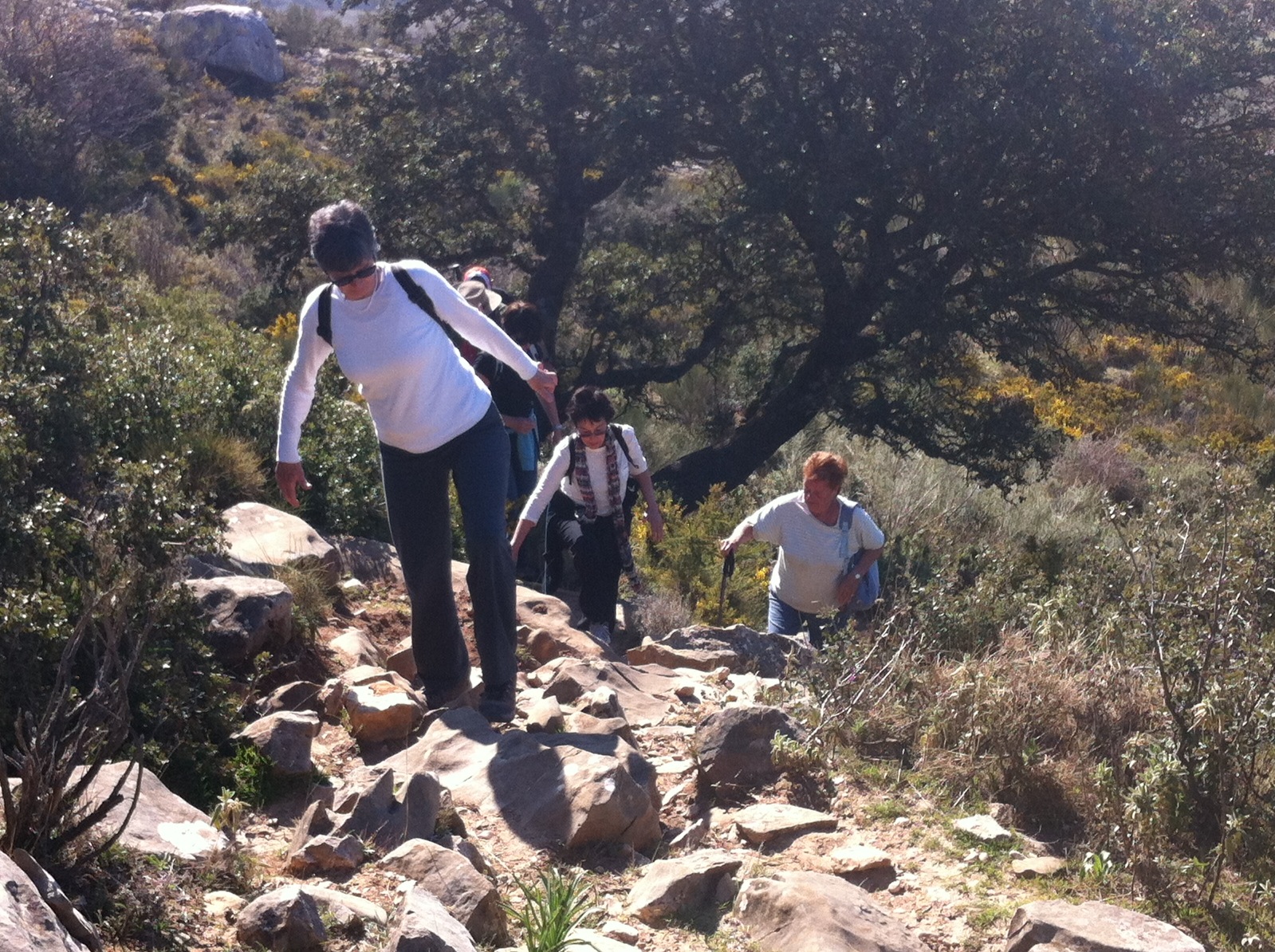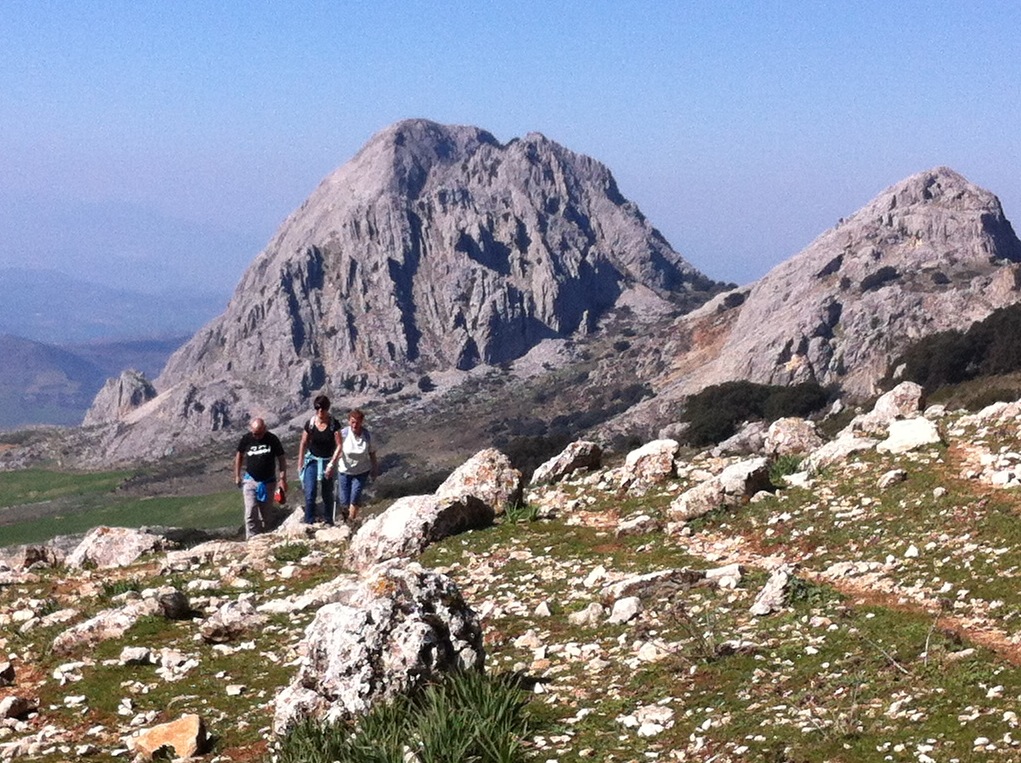Ana-Maria stared at me in disbelief outside our front doors. “¡No hay cascadas de agua por aquí!” There are no waterfalls around here, she insisted. Yes, I said, well not in the pueblo, no, but up there, up in the mountains. I pointed vaguely upwards, sort of over there ….
She’s a keen walker too. Every evening, off for the typical Spanish constitutional, along the road, up the hill, quite a long way often. But Sunday mornings are not for walking, not for most Spanish people, so she elects not to join us.
The group meets up at Venta de Moriscos and we cram into fewer cars for the short drive up a track, past the cobbled cortijo courtyard (wondering, as always, what used to happen there to have a cobbled courtyard?) to park by the pointlessly grand gates.
 Mid-March and it’s a scorcher. Top layers are left in cars. Second layers don’t last much longer as we pick our way up between gorse bushes, through the dramatic rocky landscape and past a herd of sheep. The first part is steep and boulder-strewn, and we take plenty of breaks to admire the views and catch our breath. I’m doing one of the longer GR routes shortly so it’s all good training.
Mid-March and it’s a scorcher. Top layers are left in cars. Second layers don’t last much longer as we pick our way up between gorse bushes, through the dramatic rocky landscape and past a herd of sheep. The first part is steep and boulder-strewn, and we take plenty of breaks to admire the views and catch our breath. I’m doing one of the longer GR routes shortly so it’s all good training.
It’s a multi-national group and I walk with two Spanish women. One of them tells funny stories about her work, and together we unpick the historical roots of the common prefix “guada” which arises from the Arabic “wadi” meaning water. It’s why so many rivers begin with Guada. I enjoy the Spanish practice and their company.
 Just below the massive crag we pause to watch the Griffon vultures circling before we contour along below the ridge, walking at an altitude of 1250 metres, curling round at the end to scramble down to the source of the Guadalmedina river.
Just below the massive crag we pause to watch the Griffon vultures circling before we contour along below the ridge, walking at an altitude of 1250 metres, curling round at the end to scramble down to the source of the Guadalmedina river.
A beautiful, tranquil spot, the water pooling below the spurt where it emerges from the rocks. A tree-frog sat and sunbathed, unbothered by us, the greenest green we had ever seen. .jpg) After a short rest we lost a bit more height to another viewpoint where the cascades dropped further, creating rows of rock-pools. In such a dry country, this is a rare and lovely sight and we stay, transfixed by the sight and the sound of the small waterfalls. The sunshine pours down, dapples through the trees, and dances on the water.
After a short rest we lost a bit more height to another viewpoint where the cascades dropped further, creating rows of rock-pools. In such a dry country, this is a rare and lovely sight and we stay, transfixed by the sight and the sound of the small waterfalls. The sunshine pours down, dapples through the trees, and dances on the water.
Back at Venta de Moriscos early enough to beat the Sunday lunchtime rush, we get a big terrace table. It’s a popular spot for Malagueños who are impressed by the views and the enormous rural portions. Legs rested, we reluctantly give up our table to a 4-generation family wanting to eat. In the car park, two euros buys me 5 kilos of lovely oranges for juicing. Life is good. Although oftentimes the nicest days are the ones you most want to tell someone about, who isn’t there to tell.
© Tamara Essex 2014
THIS WEEK'S LANGUAGE POINT:
Well, there were some interesting comments on the question I posed in the last blog about the use of the word “poco” in the phrase “una casa poco luminosa”! Most amusing was that when we marked the tests in class last Thursday, our teacher Juanmi couldn’t explain WHY it was “poco”! I’ve asked several highly-intelligent Spanish friends, none of whom could explain it. They all simply said that was how it was. So Juanmi is going to research a bit to find a reason. I will report back!
This week Jose and I have been working more on the conditional perfect, or second conditionals. At the same time we are working on pronunciation and fluidity. “Sherlock Holmes is the only person who would have known who stole the diamonds.” Sherlock Holmes es la unica persona que habría sabido quien robó los diamantes. “Would you (plural) have gone to the beach if it weren’t raining?” ¿Habríais ido a la playa si no lloviera? The “if” in the dependent clause triggers the imperfect subjunctive (sigh), with the other big clue being the use of “were” rather than “was”.
Normal conditionals just take the indicative – “I would have xxx but yyy happened”, or “He would have aaa except that bbb happened.” So look out for “if” which changes it – eg If I had known, I wouldn’t have come. Si hubiera sabido, no habría venido. It doesn’t matter which bit comes first – No habría venido si hubiera sabido.